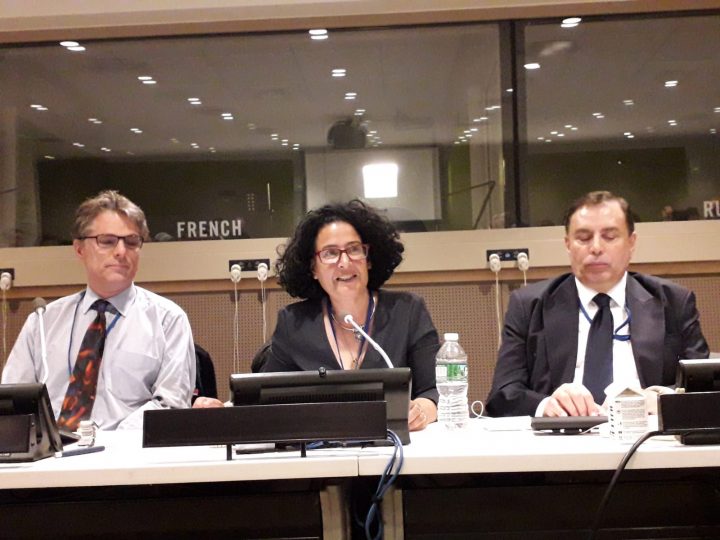On the 8th of May, the Middle East Treaty Organisation (METO) Project held a side-event with the support of the Irish Ministry of Foreign Affairs called Achieving the Possible: a WMD-free zone in the Middle East. As negotiations at the 2019 NPT PrepCom continued and Iran announced that it is suspending some of its obligations under the 2015 Iran Deal, the issue of how the international community can make progress on this issue, which is pivotal to regional and global security, is becoming increasingly pertinent.
Wael Al Assad, former Representative of the Secretary-General for Disarmament and Regional Security at the League of Arab States, and speaking in a personal capacity, highlighted the need to reframe the debate and change perceptions on the WMD-free zone in the Middle East. He said that there is a need to construct conversations in a positive manner and deconstruct the narrative that this is an initiative launched by the Arabs to disarm Israel. Instead, states should focus on the benefits of co-operation and how the Zone can serve as a platform for regional peace.
Patricia Lewis, from Chatham House in the UK, discussed states’ different approaches to the negotiations of the Zone and where scope for agreement and compromise could be found. She cautioned that, of course, there were disagreements over core issues such the role of the NPT, the responsibilities of depositories in negotiations and whether negotiations should be contingent on improvements in regional security or not. Nevertheless, she noted that all approaches to negotiations affirm the 1995 Resolution, the need for states to freely arrive at a decision and consensus. Similarly, she saw possible compromise on building technical capacity and engaging civil society in the region and the role of the UN Secretary-General in the process. She suggested that the UN could establish a regional disarmament centre that could help with the process.
Tariq Rauf, former head of IAEA Safeguards, discussed the dynamics behind the UN Resolution calling for the convening of a Conference on the Zone in November 2019. In October 2018 at the UN General Assembly, 103 states voted for the Resolution that called for the Conference, while 71 abstained and three states voted against the Resolution. He suggested that the UN route could be helpful in avoiding a repeat of 2015 in which the WMD-free zone was blamed for the failure of that year’s NPT Review Conference. He discussed the importance of the METO Project’s work and hoped the Conference can draw inspiration from their Draft Treaty.
Emad Kiyaei of the METO Project outlined its purpose. He agreed that there is a need for new and innovative thinking on this issue arguing that the creation of a WMDFZ in the Middle East is in everyone’s common interest. He said that the largest obstacle is the lack of political will and documents for states to work around. Thus, the METO Project has created an evolving, iterative Treaty for consultation. This draws on previous Treaties including those of other nuclear-weapon-free zones, the Treaty on the Prohibition of Nuclear Weapons, and the JCPOA, Iran Deal which successfully linked the UN and international support to the agreement. In addition to this, the METO Project is a forum for discussion on the Zone in the region. He outlined the importance of discussion being led by people from the region.
Sharon Dolev, also of the METO Project, further outlined its thinking. She expanded on the need to engage civil society in the region and the particular importance of Israel. She said that there is scope for changing Israeli public perception of nuclear weapons, the main challenge is that Israeli civil society does not focus on this issue currently. Rather than focusing on whether peace in the Middle East needs to come before the Zone, conversations in Israel should focus on what is possible. She said that there are good reasons to be worried about a nuclear arms race in the Middle East and called for states to talk with the Middle East, not about the Middle East when approaching the Zone. In doing so, she called for increased support for civil society efforts to raise awareness on the Zone and for more work on building support for the initiative.
The speeches were followed by a lively Q&A session in which a number of distinguished delegates involved with the November Conference praised the initiative. Sima Sami Bahous, the Jordanian Ambassador to the UN in New York and Chair of the November conference, emphasised the open and cooperative nature of the Conference in making progress towards the Zone. She stated that Jordan had already begun extensive consultations with a number of states, saying that all decisions would be taken by consensus and with the agreement of all states in the region. Participants praised the importance of having open-ended texts for creating discussions and the positive and constructive manner in which the METO Project is working to achieve the possible and create a WMD-free zone in the Middle East.
More information about the METO Project and its Draft Treaty can be found on their website: www.wmd-free.me






